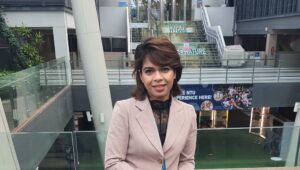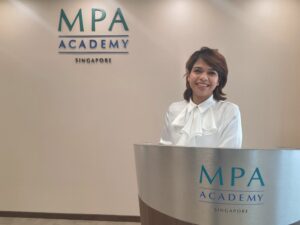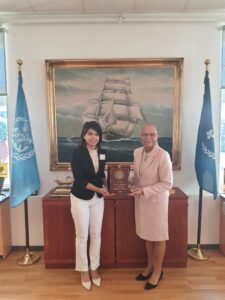I am optimistic about the success of women in the maritime field.
The experience of women entering the maritime field is dynamic and holds great promise for the industry’s growth and resilience
Since my childhood, I’ve always been drawn to challenges!
In the era of automation, digitalization, and artificial intelligence, the future of maritime education stands at a critical juncture.
By : Magdy Sadek

At the begin her exclusive interview Suraya Yeasmin Jui said to Maritime Tickers : I am grateful to have found a profession that not only aligns with my passion for challenges but also allows me to break stereotypes. She stressed that in the era of automation, digitalization, and artificial intelligence, the future of maritime education stands at a critical juncture.
She added :My MSc in Maritime Affairs specialization in Port Management from WMU, Sweden further equipped me with advanced insights into the industry’s best practices
ٍShe assured The experience of women entering the maritime field is dynamic and holds great promise for the industry’s growth and resilience noted Women constitute according to UNCTAD a more optimistic scenario in port management positions, with a global average of 34% of seafarers
in here interview dont forget that – as she said – my childhood, I’ve always been drawn to challenges!
Suraya Yeasmin Jui ;Terminal Officer , Chittagong Port Authority , Bangladesh has dedicated maritime profeeional wit over 6 years of hands – on experience in vessel operations supervision, container yardmanagement , safety compliance in Maritime Affairs , specializing in Port Manaement , from the World Maritime University She is terminal officer , Chittagong Port Authority , Bangladesh
She is adeping in applying a comprehensive skill set encompassing efficient port operations and comliance withinternational standards and has proven expertise in strategic planning , hazard regulations and collabourative stakeholders engagement

Why did you choose, as a female, to enter the maritime field even though it is mostly a male field?male
Since my childhood, I’ve always been drawn to challenges, and the idea of working in a field that pushes my limits has been a constant motivator. Initially, the maritime sector wasn’t my first choice. I aspired to carve my path in areas where women’s participation was significantly limited. So, after high school,
I decided to pursue my passion by joining the armed forces, but circumstances led me to explore other opportunities. Back then, gender discrimination was dominant in various fields, and certain professions, including mariners and GD pilots, were particularly restricted to women. Later on, our current government came into power and has diligently endeavored to promote women’s empowerment and eradicate gender discrimination across all sectors.
However, living in a time when these barriers were being dismantled, I felt a strong desire to contribute to this positive change. Then, after graduating, I selectively applied for government jobs that offered the challenge I was seeking.
Fortunately, I came across an opening with my current employer in the maritime sector. It felt like a calling, and I am grateful to have found a profession that not only aligns with my passion for challenges but also allows me to break stereotypes. Our society is evolving, and I am proud to be part of a generation that embraces diversity and works towards eliminating gender discrimination. Joining the maritime field has not only fulfilled my rebellious spirit but also provided me with a platform to make a meaningful contribution to a traditionally male-dominated industry.
Her dream

Did you face obstacles or problems when making your decision and achieving your dream?!
Yes, pursuing my dream and making significant decisions, especially in my professional journey, hasn’t been without its challenges. When I decided to pursue an MSc in Maritime Affairs at World Maritime University, Sweden, leaving my role at Chittagong Port temporarily, I encountered several obstacles. Beyond the academic and professional adjustments, being a woman added another layer of complexity.
While our country is making strides in gender equality, there’s still a need to navigate multifaceted approval for decisions, both personally and professionally. As a woman, I often found myself needing to prove my capabilities before making decisions, reinforcing the importance of perseverance and competence.
How do you evaluate the experience of women entering this field? Do you think that they succeeded in proving themselves and standing side by side with men?
I believe the experience of women entering the maritime field is dynamic and holds great promise for the industry’s growth and resilience. While global statistics indicate that women constitute only 2% of seafarers, the 2019 UNCTAD Review of Maritime Transport highlights a more optimistic scenario in port management positions, with a global average of 34% female representation. However, a closer examination of the data reveals disparities, particularly in operations and cargo-handling roles, where the percentages drop to 12.1% and 5.1%, respectively.
Despite these numbers, I am optimistic about the success of women in the maritime field. The maritime industry stands to benefit significantly from gender diversity, not just as a matter of equality but as a strategic advantage. Research consistently demonstrates that diverse teams lead to better decision-making, reduced fraud, and enhanced corporate social responsibility. Women, with their unique perspectives, contribute to innovation and can break existing barriers in a sector that requires specialized expertise.
The success of women in the maritime field is not solely about proving themselves alongside men but is an opportunity to enrich the industry with a broader talent pool and varied skills. As we work towards a more inclusive environment, women’s contributions will undoubtedly play a pivotal role in the industry’s continued growth and competitiveness. In essence, the success of women in the maritime field is not just a testament to individual achievements but a crucial step towards building a stronger, more diverse, and prosperous industry.
Working of women in Asian Countries !
As a Bangladeshi, how do you view the experience of women working in an Asian country like Bangladesh?
As a Bangladeshi, I view the experience of women working in our country as evolving positively, particularly with the current government’s strong commitment to women empowerment and the achievement of Sustainable Development Goals (SDGs), notably Goal 5: Gender equality.
The present administration has undertaken significant initiatives to improve the working environment for women, fostering inclusivity and equal opportunities. The emphasis on gender equality aligns with global aspirations, contributing to a more supportive and empowering atmosphere for women in the workforce.
This commitment has undoubtedly improved the professional landscape for women in Bangladesh compared to previous times, marking a positive shift toward greater inclusiveness and equal opportunities.
Responsibilities of her Job
Tell us about your job or responsibilities in Bandor Bhaban Chittagong Port as important in Bangladesh.
In my role at Chittagong Port Authority, I have served in various capacities, contributing significantly to the efficient functioning of the port, which is a crucial economic lifeline for Bangladesh. As a Terminal Officer, I managed diverse responsibilities, including budget preparation, container billing, and ensuring adherence to financial protocols. Whether supervising ship and yard operations or overseeing Container Freight Station (CFS) activities,
I consistently prioritized safety, efficiency, and compliance with international standards. My MSc in Maritime Affairs specialization in Port Management from WMU, Sweden further equipped me with advanced insights into the industry’s best practices. In my current role as Terminal Officer (Administration),
I play a pivotal role in fostering personnel development, ensuring the smooth operation of administration across various facilities, and implementing CPA’s objectives effectively. Overall, my experiences have contributed to the sustained growth and positive ranking of Chittagong Port, reflecting its significance as a key player in global maritime trade.
Future of maritime education in 4IR eara

In light of automation, digitization, and artificial intelligence, what is the future of maritime education as you see it?
In the era of automation, digitalization, and artificial intelligence, the future of maritime education stands at a critical juncture. The traditional roles of seafarers are undergoing a profound transformation as the maritime industry gravitates towards autonomous ship operations.
The International Maritime Organization (IMO) has outlined degrees of autonomy, from ships with automated processes to fully autonomous vessels, marking a shift that challenges the conventional norms of seafaring. As the industry moves toward unmanned or minimally manned ships, the demand for novel competencies arises, necessitating a revaluation of the skills required for future maritime operations.
Maritime education and training (MET) must adapt swiftly to equip seafarers with the expertise demanded by autonomous and digitally integrated vessels. The emphasis on non-technical skills, such as teamwork, leadership, and communication, gains prominence alongside the technical competencies.
The maritime workforce faces a dynamic landscape where Virtual Reality (VR) and Augmented Reality (AR) emerge as transformative tools for training, offering immersive and experiential learning experiences. However, challenges persist, including a potential skill gap, unequal access to quality MET across regions, and the need for global collaboration.
To navigate this evolution successfully, MET institutes globally need to proactively update their curriculum, striking a balance between existing competencies and the emerging skills required for Maritime Autonomous Surface Ships (MASS). The collaborative efforts of industry stakeholders, regulatory bodies, and educational institutions are essential to shape a future where maritime education aligns seamlessly with the demands of a technologically advanced and automated maritime industry.
Vision 2030 in Saudi Arabia
The ports of the Kingdom of Saudi Arabia have received an advanced ranking globally in light of Vision 2030. Do you follow what is happening in Saudi ports and what is your opinion?
Absolutely, I’m well-informed about Saudi Arabia’s impressive achievements in its ports, particularly with the recent jump to the 16th position in the international container handling ranking, as reported by Lloyd’s List. This progress is indeed noteworthy and aligns with the ambitious goals set forth in Vision 2030.
The commitment to upgrading port infrastructure, connecting new sea routes, and handling over 10.43 million containers in 2022 reflects a concerted effort to position the Kingdom as a global logistics hub. It’s fascinating to witness this transformation, especially considering the strategic importance of the region in international trade routes.
The increase in the UN Conference on Trade and Development’s Liner Shipping Connectivity Index and the notable improvement in the World Bank’s Logistics Performance Index highlight the tangible impact of these efforts. Saudi Arabia’s dedication to reaching over 40 million standard containers annually by 2030 is a clear indication of its commitment to sustainable economic growth and global trade integration.





Congratulations to you dearest favourite idle Madam Suraiya .
My best wishes with you forever.
Thnx for ur regards
Syed Reza Farooq
Boropul
Halisohor
Chittagong.
Thank a lot and you are welcome
This interview is truly inspiring! It’s great to see such dedication and passion in the maritime industry. Your journey and insights are commendable. Thank you, Maritime Tickers, for sharing this story.
Sincer apprication
Thank you our dear friend a lot